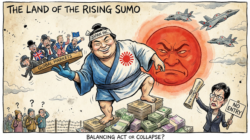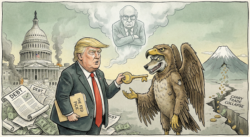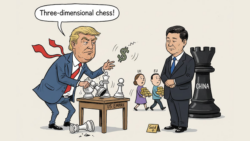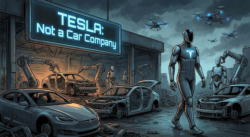What happens when a king steps down?
This week, the Oracle of Omaha decided his reign was at its end. Warren Buffett, the most revered and iconic investor probably ever, decided it was time to retire.
And just like that, the investing legend exits, leaving behind the epitome of American capitalism several hundred billion in cash, and a whole lot of pressure for the next few decades of decision making.
Such was the surprise from Buffett that Berkshire stock dropped 5% in the next trading session. And it got me thinking, maybe this actually makes Berkshire better.
So, I ask, how much is one person really worth to a company? But perhaps more importantly, when an iconic leader departs, maybe it’s the best time to buy a stock.
Five million percent again?
To be clear, Berkshire is in no crisis. They have hundreds of billions in stock investments still, but Buffett did sell down a lot recently and they’re said to have around $334 billion more in cash.
Sure, they’re invested well, been ruthless in their approach to turning around distressed companies early on, and it’s said since the early days have delivered over five million percent returns to long term holders.
They also aren’t an ETF, so they trade at a premium to investments held. It’s not huge but it certainly is part of the “Buffett effect”.
Now that’s gone, is Berkshire just an ETF? Or can they deliver five million percent more to the next batch of investors?
Greg Abel will take over. He’s been running the non-insurance businesses for years. The investing side is now largely Todd Combs and Ted Weschler. So, operationally, Berkshire won’t miss Buffett.
In fact, perhaps with him gone, they will take a renewed approach to investing, without the legacy of Buffett and Munger lingering around? Perhaps Berkshire is as good an investment today, as it was in the 80s?
I’d suggest there’s a spate of companies you know pretty well that all have iconic leaders, much like Buffett, almost bigger than the company itself that could do with some fresh blood.
That maybe while they’re successful, they’d be even more successful by “killing the king” so to speak, of course.
Tesla’s $50 billion wobble
Just this month, we got a glimpse of what that could look like.
The Wall Street Journal reported that Tesla’s board had been looking for a possible CEO successor. The company immediately denied it, strongly denied it, even said they’d told the WSJ they’d denied it, but it went to print anyway.
The news sent the stock initially down, opening the opportunity, but then it strongly bounced higher. My view is the bounce was on the idea that maybe Musk should be replaced.
The idea that one man, who also runs two other companies and posts memes at 2am, might one day step aside, or be asked to move aside, is tantalising.
In fact, if that happens, I think Tesla becomes even bigger, greater and more successful under someone that isn’t Musk.
The case for killing the king
There are several examples of when the iconic leader moves aside the company explodes to even greater success.
Microsoft is up more than 1,000% since Bill Gates stepped aside. Granted they missed with their first swing at success with Steve Ballmer. But on their second swing with Satya Nadella, the company is far more important and valuable than when Gates was at the helm.
When Jeff Bezos stepped down at the absolute peak of the market in 2021, you’d have thought that Andy Jassy would be in for a Steve Ballmer tenure.
But Jassy has tidied up the e-commerce division (in particular Prime), focused heavily on AWS and AI investment, and brought a discipline Bezos never cared for.
And earlier this year before the Trump turmoil kicked in, Amazon was up 36% in the volatile period since Bezos’s departure.
Google’s founders, Larry Page and Sergey Brin vanished into the ether years ago (both are certainly two of the more eccentric but iconic leaders of their time). When they departed, Google stock was around $65. Yet under Sundar Pichai’s quiet leadership Alphabet has become bigger, better and stronger than ever (too strong according to the courts).
With a 220% rise in stock price since the kings of Google left, it’s a good argument to make they’re better off.
And perhaps most relevant of all, Apple under Tim Cook since 2011, has seen its stock price rise over 1,200% since Steve Jobs stepped aside due to his declining health.
Yes, Jobs created, ran into the ground, and then saved Apple. But Cook scaled it. He industrialised it. He turned Apple from a miracle into a juggernaut and perhaps…has been even more important to its long-term success than Jobs was?
As iconic and seemingly irreplaceable as these kings are, real success seems to accelerate when the dreamer leaves and the operator arrives.
There’s one more though that could be more important than all I’ve mentioned so far…
The AI King
Nvidia is arguably the most important company in the world right now. It’s not just the power behind AI, it is AI. Without Nvidia, AI as we know it doesn’t exist.
Every datacentre, every inference model, every state-backed sovereign AI program from the US to Saudi depends on Nvidia chips.
And it all runs through Jensen Huang. From the $40,000 he started it all with to the snake-skin leather-jacketed showcase of their annual GTC event – Huang is as iconic as Jobs, Gates, Bezos, Musk and Buffett.
But what happens when he goes?
Huang is 61. Clearly the visionary now. But he won’t be there forever. 10 years? 15 years tops?
So, is Nvidia’s $2.7 trillion value a bet on AI leadership for decades beyond Huang’s existence, or a build all on one man’s vision?
When they step away, buy
There are more of these kings in the market, Mark Zuckerberg at Meta, Sam Altman at OpenAI, Alex Karp at Palantir, Larry Fink at BlackRock.
All headline makers, all achieved incredible success with their respective companies.
Maybe when the king is gone can the kingdom finally get to work.
Microsoft, Amazon, Apple, Google — all became better after their kings left.
Tesla, Meta, Nvidia go on to even bigger highs when Musk, Zuck and Huang are all gone.
And while the legend of Buffett will linger forever, maybe Berkshire without Buffett is a god-send. An opportunity for a whole new generation of investors to profit from the next generation of Berkshire investments.
Regards,

Sam Volkering
Contributing Editor, Investor’s Daily
P.S. When legends like Buffett and Munger step aside, a vacuum of opportunity is created. The world is changing hands—and fear is filling the gap. Especially in AI. But as Buffett said: “Be greedy when others are fearful.” That’s why James Altucher is zeroing in on what he calls AI 2.0—a new phase of artificial intelligence reshaping entire industries behind the scenes. It’s not hype. It’s your chance to get in before the next tech giants emerge. He calls it a Wealth Window. I suggest you consider stepping through it.
Still Faking It
Bill Bonner, from the ranch at Gualfin, Argentina
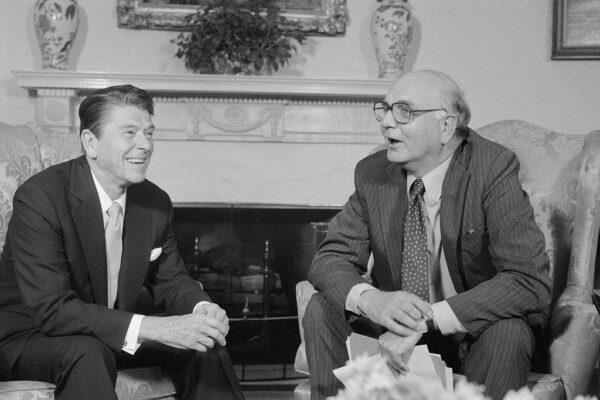
President Reagan meets with Fed Chair Paul Volcker in the Oval Office, July 16th, 1981, Source: Getty Images
No financial analyst — no matter how bright his suspenders…and how gaudy his bow tie — should merit any attention unless he lived through the Reagan Revolution. There, he saw the clumsy interplay between politics and monetary policies.
Reagan’s promise to reduce the power of government was a flop; it grew larger than ever. But Reagan backed Volcker who succeeded in stopping the inflation that had plagued the country. A real boom followed.
Young analysts don’t know how lucky they are. The Trump Team is the most ambitious — in terms of new policies — since Franklin Roosevelt. Almost all of them will backfire…or simply fizzle out.
The press reports that the Trump Team is ‘disrupting’ things. It is introducing ‘game changer’ new policies, it says.
Hallelujah!
Things need to be disrupted – otherwise, the country is headed for crisis and chaos.
But on closer inspection, the game remains much the same. Fortune:
“This is going to lead to the construction of a lot of plants, in this case auto plants,” Trump said upon announcing the tariffs in March. “You’re going to see numbers like you haven’t seen… in terms of employment. You’re going to have a lot of people making a lot of cars.”…But the U.S. plan to strengthen blue collar work may be backfiring. President Donald Trump’s 25% tariff on imported cars could actually be sweeping away auto job opportunities for Americans, despite aiming to do the opposite.
The real cause of America’s shrinking manufacturing capacity is not the nation’s past trade policies (favoring free trade). It’s our monetary policies (favoring fake money!) No disruption of US monetary policy has been proposed. So, prepare for more floppy policies; don’t expect a real boom.
Trump’s ‘drill baby drill’ and trade war policies, for example, may not be boosting the US oil business, either. NBC News:
President Donald Trump wants the oil and gas industry to “drill, baby, drill” in pursuit of his energy dominance agenda, but the companies involved in the actual drilling and servicing of wells have instead taken a beating during his first 100 days in office. U.S. crude oil prices have fallen below $65 per barrel, down more than 20% since Trump’s second term began, making it unprofitable for many companies to boost production, according to a survey by the Federal Reserve Bank of Dallas.
The low-cost producers are in the Middle East and Russia, not in the US. And when prices go down, it’s the marginal producers — not the ‘core’ pumpers in the Saudi desert — who suffer. Trump’s energy policy was meant to boost US energy companies. Instead, it may be putting them out of business. Bloomberg:
Oil dropped after OPEC+ agreed to another large output increase, raising concern that additional supply could lead to a global glut just as the trade war threatens demand.
Activist policies always fail. Because they disrupt the natural, spontaneous arrangements that people make on their own. Left to their own devices, for example, businesses trade with whomever they want…however they choose. That’s what free trade is all about, not forcing other countries to follow your labor or currency commandments.
But along comes the Trump Team with a ‘trade policy.’ What happens? Trade declines…shippers and container ports are already slowing down. Bloomberg reports that a single ship, now arriving at Long Beach harbor, faces $417 million in new tariffs. Ultimately, that charge gets passed along to consumers and investors. People get less of what they want, pay more for it…and the administration claims victory.
Even when the feds aim to reverse previous policy mistakes…they generally fail to do it. In the latest employment numbers, for example, is a real petard. DOGE, as we all know, has been ‘disrupting’ the federal workforce. According to the press, hundreds of thousands of federal employees have been tossed out onto the streets…the whole federal establishment is supposed to be as quiet and gloomy as an empty morgue.
But wait. The employment numbers show total employment increasing, not falling. What happened to those disappeared federal workers? And then, looking closer, we find that the number of people currently employed by the federal government is almost exactly the same as it was a year ago when Joe Biden was president.
There were 2,378,000 federal employees a year ago. Guess how many there were last month? It was 2,379,000 (see Table B-1 in the link below). Total Federal employment IS down since January (and fell by 9,000 jobs in April). But it’s virtually the same this time last year. The Establishment Survey used by the BLS may not yet include terminated workers who are still receiving severance and therefore still counted as ‘employed.’ We’ll know more next month.
What about those manufacturing jobs? The tariffs have supposedly led to many businesses moving their factories to the US. If so, they haven’t begun hiring. The latest numbers show manufacturing jobs actually went down by 1,000.
In the last few days, America’s own Hannibal — Pete Hegseth — announced he would cut the number of high-ranking generals by 20%. Newsweek:
Trump Administration Slashing Four-Star Generals in Bid to Shrink Pentagon
But wait. Team Trump intends to propose increasing the Pentagon budget by 13% to $1 trillion, an increase of $113 billion.
Disruption?
Game changer?
Not exactly.
Regards,

Bill Bonner
Contributing Editor, Investor’s Daily
For more from Bill Bonner, visit www.bonnerprivateresearch.com

